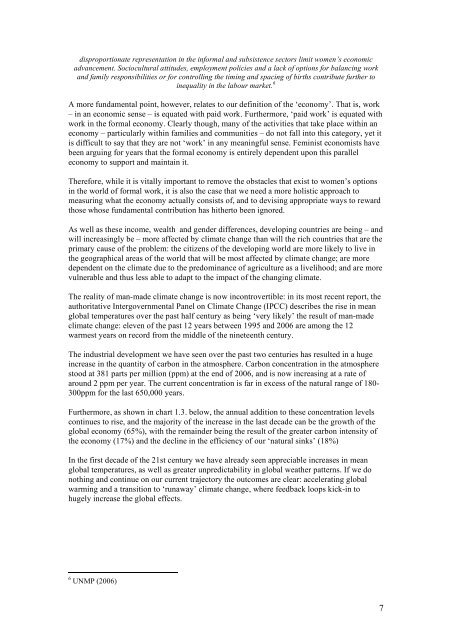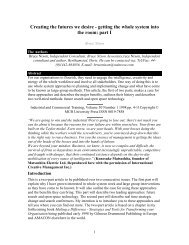From Old Economics to New Economics- Radical ... - Bruce Nixon
From Old Economics to New Economics- Radical ... - Bruce Nixon
From Old Economics to New Economics- Radical ... - Bruce Nixon
You also want an ePaper? Increase the reach of your titles
YUMPU automatically turns print PDFs into web optimized ePapers that Google loves.
disproportionate representation in the informal and subsistence sec<strong>to</strong>rs limit women’s economic<br />
advancement. Sociocultural attitudes, employment policies and a lack of options for balancing work<br />
and family responsibilities or for controlling the timing and spacing of births contribute further <strong>to</strong><br />
inequality in the labour market. 6<br />
A more fundamental point, however, relates <strong>to</strong> our definition of the ‘economy’. That is, work<br />
– in an economic sense – is equated with paid work. Furthermore, ‘paid work’ is equated with<br />
work in the formal economy. Clearly though, many of the activities that take place within an<br />
economy – particularly within families and communities – do not fall in<strong>to</strong> this category, yet it<br />
is difficult <strong>to</strong> say that they are not ‘work’ in any meaningful sense. Feminist economists have<br />
been arguing for years that the formal economy is entirely dependent upon this parallel<br />
economy <strong>to</strong> support and maintain it.<br />
Therefore, while it is vitally important <strong>to</strong> remove the obstacles that exist <strong>to</strong> women’s options<br />
in the world of formal work, it is also the case that we need a more holistic approach <strong>to</strong><br />
measuring what the economy actually consists of, and <strong>to</strong> devising appropriate ways <strong>to</strong> reward<br />
those whose fundamental contribution has hither<strong>to</strong> been ignored.<br />
As well as these income, wealth and gender differences, developing countries are being – and<br />
will increasingly be – more affected by climate change than will the rich countries that are the<br />
primary cause of the problem: the citizens of the developing world are more likely <strong>to</strong> live in<br />
the geographical areas of the world that will be most affected by climate change; are more<br />
dependent on the climate due <strong>to</strong> the predominance of agriculture as a livelihood; and are more<br />
vulnerable and thus less able <strong>to</strong> adapt <strong>to</strong> the impact of the changing climate.<br />
The reality of man-made climate change is now incontrovertible: in its most recent report, the<br />
authoritative Intergovernmental Panel on Climate Change (IPCC) describes the rise in mean<br />
global temperatures over the past half century as being ‘very likely’ the result of man-made<br />
climate change: eleven of the past 12 years between 1995 and 2006 are among the 12<br />
warmest years on record from the middle of the nineteenth century.<br />
The industrial development we have seen over the past two centuries has resulted in a huge<br />
increase in the quantity of carbon in the atmosphere. Carbon concentration in the atmosphere<br />
s<strong>to</strong>od at 381 parts per million (ppm) at the end of 2006, and is now increasing at a rate of<br />
around 2 ppm per year. The current concentration is far in excess of the natural range of 180-<br />
300ppm for the last 650,000 years.<br />
Furthermore, as shown in chart 1.3. below, the annual addition <strong>to</strong> these concentration levels<br />
continues <strong>to</strong> rise, and the majority of the increase in the last decade can be the growth of the<br />
global economy (65%), with the remainder being the result of the greater carbon intensity of<br />
the economy (17%) and the decline in the efficiency of our ‘natural sinks’ (18%)<br />
In the first decade of the 21st century we have already seen appreciable increases in mean<br />
global temperatures, as well as greater unpredictability in global weather patterns. If we do<br />
nothing and continue on our current trajec<strong>to</strong>ry the outcomes are clear: accelerating global<br />
warming and a transition <strong>to</strong> ‘runaway’ climate change, where feedback loops kick-in <strong>to</strong><br />
hugely increase the global effects.<br />
6 UNMP (2006)<br />
7



